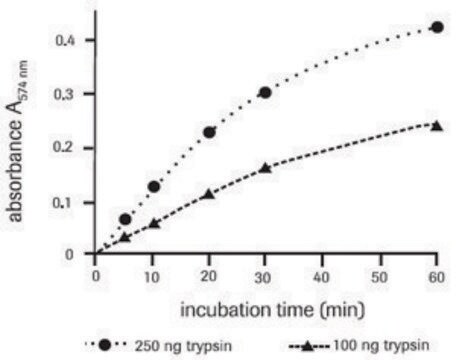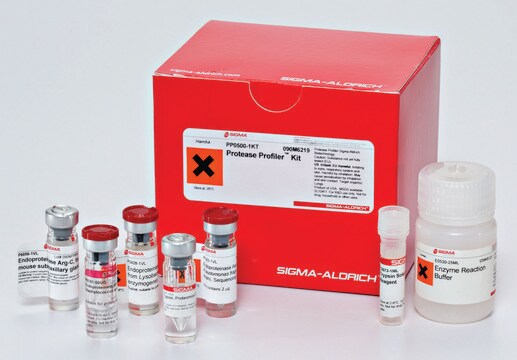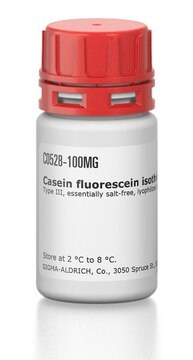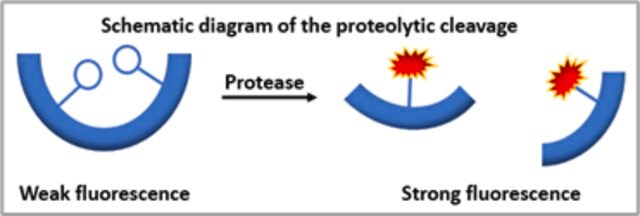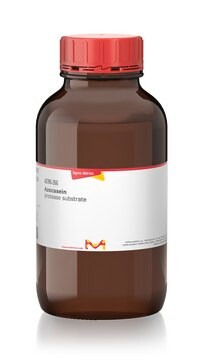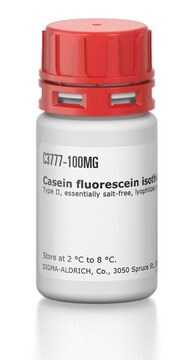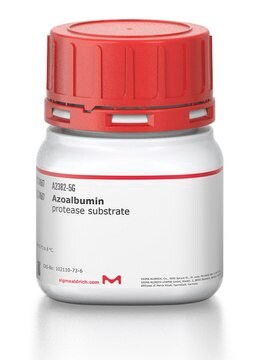PF0100
Protease Fluorescent Detection Kit
high sensitivity assay
Synonym(s):
Protease Assay Kit
Sign Into View Organizational & Contract Pricing
All Photos(3)
About This Item
UNSPSC Code:
12352202
NACRES:
NA.26
Recommended Products
Application
Protease Fluorescent Detection Kit has been used:
- in the detection of proteolytic activity using casein based protease assay
- for testing the extracellular proteolytic activity of fungal strains
- for quantifying mitochondrial protease activity
- for measuring the protease production from soil solution
Suitability
Detection limit: approx. 50 ng trypsin
Quantity
Supplied with sufficient reagents for up to 200 one mL assays.
Supplied with sufficient reagents for up to 200 one mL assays.
The trichloroacetic acid (TCA) component is provided as 6.1 N TCA solution. 0.6 N TCA Solutions may be prepared by a 10-fold dilution of the desired volume of T0699 with ultrapure water. It is not necessary to dilute the entire volume of T0699 for immediate use of the kit.
The trichloroacetic acid (TCA) component is provided as 6.1 N TCA solution. 0.6 N TCA Solutions may be prepared by a 10-fold dilution of the desired volume of T0699 with ultrapure water. It is not necessary to dilute the entire volume of T0699 for immediate use of the kit.
Analysis Note
Tested for detection of all four proteolytic classes (serine, apartic, cysteine and metalloproteinases).
Kit Components Only
Product No.
Description
- Incubation buffer 25 mL
- FITC-casein solution 5 mL
- Assay buffer 200 mL
- Protease standard (trypsin) 20 μg
- FITC control 50 mg
- Trichloroacetic acid (TCA) solution 30 mL
Signal Word
Danger
Hazard Statements
Precautionary Statements
Hazard Classifications
Aquatic Acute 1 - Aquatic Chronic 1 - Eye Dam. 1 - Resp. Sens. 1 - Skin Corr. 1A - Skin Sens. 1 - STOT SE 3
Target Organs
Respiratory system
Storage Class Code
8A - Combustible corrosive hazardous materials
Flash Point(F)
Not applicable
Flash Point(C)
Not applicable
Choose from one of the most recent versions:
Already Own This Product?
Find documentation for the products that you have recently purchased in the Document Library.
Customers Also Viewed
Qiang Fu et al.
Radiation research, 175(6), 728-735 (2011-05-03)
The somatostatin analog SOM230 has potent radioprophylactic and radiation mitigating properties that are unrelated to cytoprotection but appear to be due to suppression of secretion of pancreatic enzymes into the intestinal lumen. To determine the maximal postirradiation time window for
Selena Gimenez-Ibanez et al.
PLoS biology, 12(2), e1001792-e1001792 (2014-02-22)
Pathogenicity of Pseudomonas syringae is dependent on a type III secretion system, which secretes a suite of virulence effector proteins into the host cytoplasm, and the production of a number of toxins such as coronatine (COR), which is a mimic
Martin H Kunzmann et al.
Molecular bioSystems, 8(11), 3061-3067 (2012-09-20)
α-Alkylidene-γ-butyrolactones are quite common in nature and exhibit a broad spectrum of biological activities. We therefore synthesized a small library of xanthatine inspired α-alkylidene-γ-butyrolactones to screen non-pathogenic and uropathogenic E. coli strains by activity based protein profiling (ABPP). The identified
Joseph S Rom et al.
Virulence, 8(8), 1776-1790 (2017-09-15)
Staphylococcus aureus causes acute and chronic forms of infection, the latter often associated with formation of a biofilm. It has previously been demonstrated that mutation of atl, codY, rot, sarA, and sigB limits biofilm formation in the USA300 strain LAC
Contrasting effects of increased carbon input on boreal SOM decomposition with and without presence of living root system of Pinus sylvestris L.
Linden, A., et al.
Plant and Soil, 377, 145-158 (2014)
Our team of scientists has experience in all areas of research including Life Science, Material Science, Chemical Synthesis, Chromatography, Analytical and many others.
Contact Technical Service
